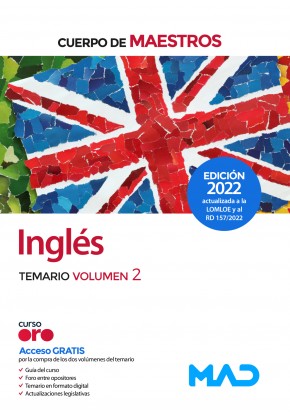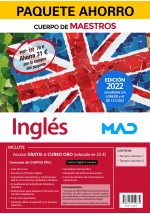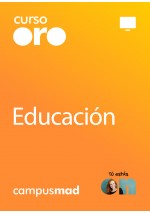
 Fracciona tu pago desde 3 meses sin intereses por compras superiores a 120€
Fracciona tu pago desde 3 meses sin intereses por compras superiores a 120€
Cuerpo de Maestros. Inglés

Ahorra 31€ + 5% descuento online (incluye en papel: Temario volúmenes 1 y 2; y acceso online gratis a Curso Oro)
97,20 €
66,50 €
| ¿Qué incluye? | |
| Temas del 13 al 25 | Actualizado con novedades legislativas |
| GRATIS Curso Oro* | Recursos didácticos |
* Consulta los libros necesarios para acceder GRATIS al Curso Oro.
| Descripción | add clear |
Editorial MAD y Trivium Centro de Oposiciones de Murcia le ofrecen una nueva edición actualizada del temario de Inglés para el acceso al cuerpo de Maestros según el programa oficial vigente.
Este volumen incluye los temas 13 a 25 del temario, elaborados teniendo en cuenta la Ley Orgánica 3/2020, de 29 de diciembre, por la que se modifica la Ley Orgánica 2/2006, de 3 de mayo, de Educación (LOMLOE) y el Real Decreto 157/2022, de 1 de marzo, por el que se establecen la ordenación y las enseñanzas mínimas de la Educación Primaria.
Los temas responden fielmente a los epígrafes e incluyen índice, introducción, conclusión, resumen y bibliografía especializada. Todos ellos se han redactado con profundidad y rigor para asegurar una preparación eficaz y completa. En esta ocasión se han incorporado recursos didácticos y enlaces a través de códigos QR a páginas de interés y vídeos ilustrativos que le ayudarán a ampliar y fijar unos contenidos que, aunque vigentes desde el año 1993, han sido adecuadamente actualizados.
| Índice | add clear |
Topic 13. History of the development of foreign language teaching: from the grammar-translation method to current approaches.
Topic 14. Methods and techniques focused on the acquisition of communicative competences. Methodological foundations for the teaching of English as a Foreign Language.
Topic 15. Periods, authors and most suitable genres to be used in the English lessons. Types of texts.
Topic 16. Children’s Literature in English. Techniques to introduce listening comprehension, initiate and encourage reading habits and raise awareness of the poetic function of language.
Topic 17. Songs as poetic and literary creations in the English language classroom. Typology of songs. Techniques for using songs to learn phonetics, vocabulary and culture.
Topic 18. The role of games and creativity in foreign language learning. Definition and classification of games for language learning and improvement. Games as a creative, fun technique to achieve communicative competence in the foreign language.
Topic 19. Animation and expression techniques as a resource for learning foreign languages. Dramatisation of everyday situations, stories, role-plays, characters, jokes, etc. Group work for creative tasks. The teacher’s role.
Topic 20. Foreign languages as one of the subjects in the curriculum. Criteria to be reflected in the School Education Project and in the School Curriculum Project.
Topic 21. Planning for the English language subject: unit plans. Criteria for sequencing and timing contents and objectives. Selection of the methodology to be used in learning and assessment activities.
Topic 22. Variables to be taken into account in the organisation of the English lessons: pupils’ grouping, distribution of time and space, selection of methodologies, teacher’s role, etc.
Topic 23. Designing curricular materials for the English class. Criteria for choosing and using a textbook. Authentic and adapted documents: limitations of use. Pupils’ collaboration in designing materials.
Topic 24. Technological and pedagogical aspects in the use of audio-visual materials (newspapers, television, cassette player, video, etc.). Computers as a complementary aid for learning and improving foreign languages.
Topic 25. The process of foreign language teaching and learning focused on the pupil: basis and applications. Identification of motivations and attitudes towards the English language. Practical applications.
3043
Total plazas convocadas
Alertas MAD
¿Quieres estar informado de todas las oposiciones que sean de tu interés?







